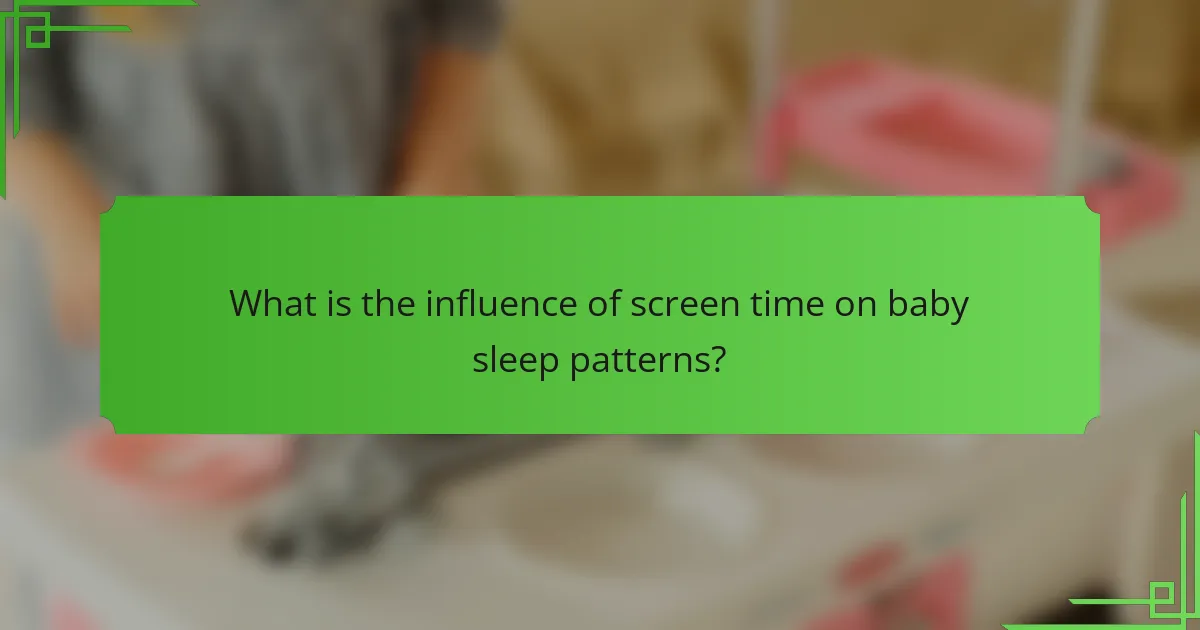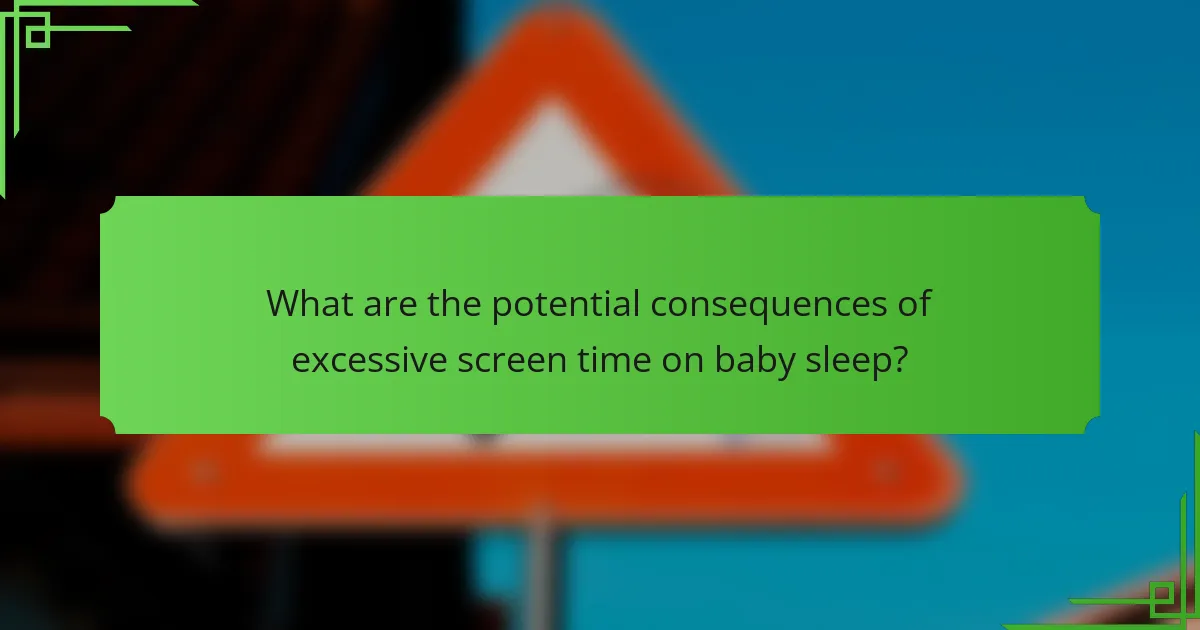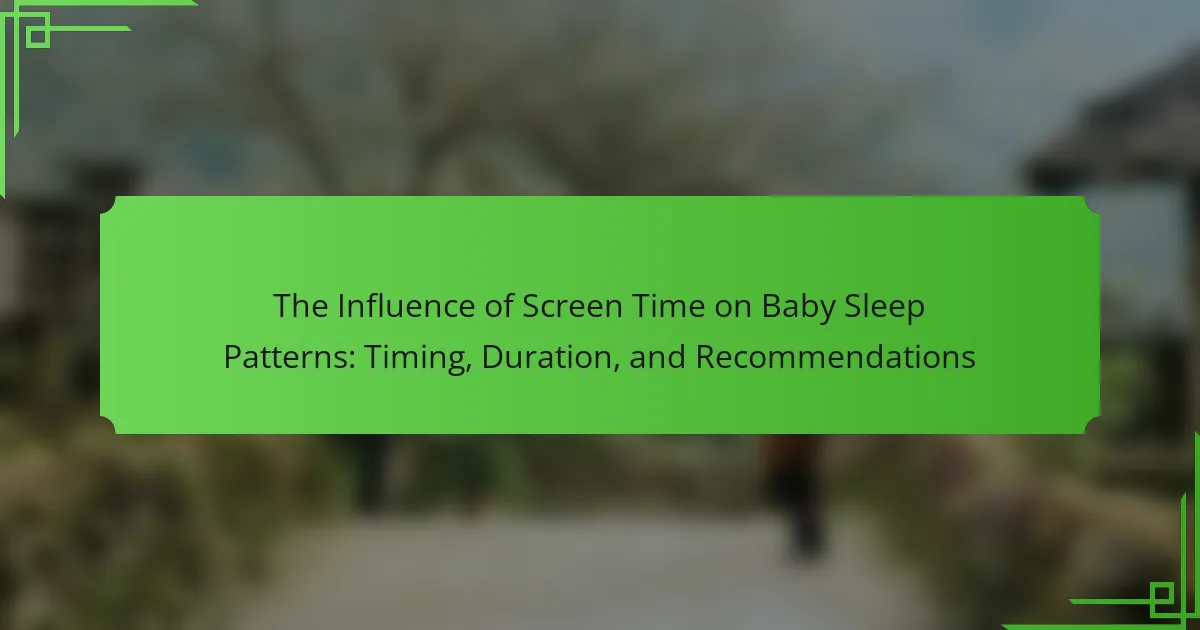Screen time significantly impacts baby sleep patterns, leading to difficulties in falling asleep and reduced total sleep duration. The blue light emitted by screens disrupts melatonin production, a hormone essential for regulating sleep cycles. Research indicates that infants exposed to screens, particularly before bedtime, experience shorter sleep duration and more sleep disturbances. Recommendations for parents include limiting screen time, especially in the evening, to promote healthier sleep quality in babies. The article explores the timing and duration of screen exposure and its effects on infant sleep, supported by findings from studies published in reputable journals.

What is the influence of screen time on baby sleep patterns?
Screen time negatively influences baby sleep patterns. Increased exposure to screens can lead to difficulties in falling asleep. It can also reduce total sleep duration. The blue light emitted by screens interferes with melatonin production. Melatonin is crucial for regulating sleep cycles. Research indicates that infants exposed to screens before bedtime sleep less and have more disrupted sleep. A study published in the journal “Pediatrics” found that screen time is associated with shorter sleep duration in children. Reducing screen time, especially before sleep, is recommended for better sleep quality in babies.
How does screen time affect babies’ sleep quality?
Screen time negatively affects babies’ sleep quality. Exposure to screens can lead to increased difficulty in falling asleep. This is primarily due to the blue light emitted by devices. Blue light interferes with the production of melatonin, a hormone that regulates sleep. Research indicates that infants with higher screen time experience shorter sleep duration. A study published in the journal “Pediatrics” found that excessive screen exposure correlates with disrupted sleep patterns in young children. Thus, limiting screen time can improve sleep quality for babies.
What specific sleep patterns are impacted by screen time?
Screen time negatively impacts several specific sleep patterns. It can delay sleep onset, reducing total sleep duration. Increased screen exposure is linked to more frequent awakenings during the night. Screen time also disrupts circadian rhythms, affecting overall sleep quality. A study by Hale and Guan (2015) found that children with higher screen time experienced shorter sleep duration. Additionally, blue light emitted from screens interferes with melatonin production, which is crucial for sleep regulation. These factors collectively contribute to poorer sleep outcomes in children.
How does screen time influence the duration of sleep?
Screen time negatively impacts the duration of sleep. Increased exposure to screens before bedtime can delay sleep onset. The blue light emitted by screens inhibits melatonin production. Melatonin is crucial for regulating sleep cycles. Research indicates that children with high screen time sleep less overall. A study published in the journal “Sleep Medicine” found that increased screen time correlates with shorter sleep duration in children. Reducing screen time before bed can improve sleep quality and duration.
What are the recommended screen time limits for babies?
The recommended screen time limit for babies under 18 months is zero. The American Academy of Pediatrics advises against screen time for this age group, except for video chatting. For children aged 18 to 24 months, parents should choose high-quality programming and watch it together. For toddlers aged 2 to 5 years, the limit is one hour of high-quality programming per day. This guidance is based on research highlighting the potential negative effects of screen time on development and sleep patterns. Excessive screen time can interfere with sleep and hinder cognitive development.
What guidelines do experts suggest for screen time duration?
Experts suggest that children aged 2 to 5 should have no more than one hour of screen time per day. This guideline is supported by the American Academy of Pediatrics (AAP). For children younger than 18 months, screen time should be avoided, except for video chatting. The AAP emphasizes the importance of engaging in interactive activities instead of passive screen time. For older children, consistent limits on screen time are recommended. These limits help promote healthy sleep patterns and development.
How do age and development stage affect screen time recommendations?
Age and development stage significantly influence screen time recommendations. Infants aged 0-18 months should avoid screen time, except for video chatting. This is because early exposure can hinder brain development. For children aged 18-24 months, limited high-quality programming is recommended. Parents should co-view to enhance understanding. Preschoolers aged 2-5 years should have no more than one hour of screen time daily. This limit supports healthy development and social interaction. For children aged 6 years and older, consistent limits on screen time are advised. These limits should ensure time for physical activity, sleep, and other healthy behaviors. The American Academy of Pediatrics provides these guidelines to promote balanced media use.

What factors contribute to the influence of screen time on baby sleep?
Screen time can significantly influence baby sleep due to several factors. The timing of screen exposure is crucial; screens used close to bedtime can disrupt circadian rhythms. The blue light emitted by screens interferes with melatonin production, which is essential for sleep onset. Additionally, the content consumed can be stimulating, increasing alertness rather than promoting relaxation. Duration of screen time also matters; excessive exposure can lead to increased wakefulness and reduced sleep duration. Research indicates that infants exposed to screens for more than an hour a day may experience poorer sleep quality. These factors collectively contribute to the detrimental effects of screen time on baby sleep patterns.
How does the timing of screen exposure impact sleep patterns?
Timing of screen exposure significantly impacts sleep patterns. Exposure to screens before bedtime can delay sleep onset. This is due to the blue light emitted by screens, which suppresses melatonin production. Melatonin is a hormone crucial for regulating sleep-wake cycles. Studies indicate that children exposed to screens within an hour of bedtime experience poorer sleep quality. According to research published in the Journal of Clinical Sleep Medicine, screen time can lead to increased sleep latency and reduced total sleep time. Therefore, limiting screen exposure in the evening is advisable for better sleep outcomes.
What are the effects of screen time before bedtime?
Screen time before bedtime negatively affects sleep quality. Exposure to screens can disrupt the production of melatonin, a hormone that regulates sleep. Studies indicate that blue light emitted by screens can delay sleep onset. Research published in the journal “Sleep Medicine Reviews” shows that children with increased screen time experience shorter sleep duration. Additionally, screen time can lead to increased alertness, making it harder to fall asleep. The American Academy of Pediatrics recommends limiting screen use before bedtime to promote better sleep.
How does the type of content viewed influence sleep quality?
The type of content viewed significantly influences sleep quality. Engaging or stimulating content, such as action movies or video games, can increase arousal and delay sleep onset. Conversely, calming content, like nature documentaries or soft music, can promote relaxation and facilitate sleep. Research indicates that exposure to blue light from screens can disrupt melatonin production, further affecting sleep quality. A study published in the Journal of Clinical Sleep Medicine found that children exposed to screens before bedtime experienced poorer sleep quality. Therefore, the nature of the content viewed is crucial for optimizing sleep quality.
What role does parental involvement play in managing screen time?
Parental involvement is crucial in managing screen time for children. Active engagement from parents helps set boundaries and guidelines for screen use. Research indicates that children with involved parents tend to have healthier screen time habits. A study published in the journal “Pediatrics” found that parental monitoring significantly reduces excessive screen time. Parents can model appropriate screen behaviors, influencing their children’s choices. Furthermore, consistent communication about the content and duration of screen use fosters better understanding. This involvement can lead to improved sleep patterns in children, as regulated screen time is linked to better sleep quality.
How can parents effectively monitor screen time for their babies?
Parents can effectively monitor screen time for their babies by setting clear limits and using parental control tools. Establishing a daily screen time allowance helps manage exposure. Engaging in alternative activities encourages less reliance on screens. Parents should also observe their baby’s reactions to screen time. Noting signs of overstimulation is crucial. Regularly reviewing and adjusting screen time based on their baby’s needs promotes healthy habits. Research indicates that excessive screen time can disrupt sleep patterns in infants. The American Academy of Pediatrics recommends minimal screen time for children under 18 months.
What strategies can parents use to reduce screen time before sleep?
Parents can implement several strategies to reduce screen time before sleep. Establishing a screen-free bedtime routine can help signal to children that it is time to wind down. Setting specific times for screens to be turned off each evening is crucial. Encouraging alternative activities such as reading or storytelling can provide engaging options. Creating a charging station outside of the bedroom prevents devices from being used late at night. Parents can also model healthy screen habits by limiting their own device use before bed. Research indicates that reducing screen time improves sleep quality in children. A study published in the journal “Sleep Medicine” found that children who engaged in less screen time before sleep experienced better sleep outcomes.

What are the potential consequences of excessive screen time on baby sleep?
Excessive screen time can negatively affect baby sleep. It may lead to delayed sleep onset and reduced total sleep duration. Blue light emitted from screens can interfere with melatonin production. This hormone is crucial for regulating sleep-wake cycles. Studies indicate that infants exposed to screens before bedtime experience more sleep disturbances. Research published in the Journal of Pediatrics found that increased screen time correlates with shorter sleep duration in young children. Parents should limit screen exposure, especially close to bedtime, to promote healthier sleep patterns.
How can excessive screen time lead to sleep disturbances?
Excessive screen time can lead to sleep disturbances by interfering with the body’s natural sleep-wake cycle. Screen exposure, particularly before bedtime, emits blue light. This blue light suppresses melatonin production, a hormone crucial for sleep regulation. Reduced melatonin levels can delay sleep onset and diminish sleep quality. Research indicates that children who engage in high screen time report more sleep issues. A study by Hale and Guan (2015) found that increased screen time correlates with shorter sleep duration in children. Thus, limiting screen time, especially in the evening, is essential for promoting better sleep.
What are the long-term effects of poor sleep due to screen time?
Long-term effects of poor sleep due to screen time include cognitive impairment and emotional issues. Research indicates that inadequate sleep negatively impacts brain function. Children exposed to excessive screen time may experience reduced attention spans. They can also face difficulties in learning and memory retention. Furthermore, chronic poor sleep can lead to anxiety and depression. The American Academy of Pediatrics highlights these risks associated with screen time before bed. Studies suggest that blue light from screens disrupts melatonin production. This disruption can result in longer-term sleep disturbances.
How does disrupted sleep impact a baby’s overall development?
Disrupted sleep negatively impacts a baby’s overall development. It can lead to cognitive delays and hinder brain growth. Sleep is crucial for memory consolidation and learning. Babies require adequate sleep for emotional regulation. Disruptions can result in increased irritability and difficulty in social interactions. Research indicates that infants with poor sleep patterns may experience growth issues. The American Academy of Pediatrics emphasizes the importance of consistent sleep for developmental milestones.
What practical recommendations can help improve baby sleep patterns?
Establishing a consistent bedtime routine can significantly improve baby sleep patterns. A predictable schedule helps signal to the baby that it is time to wind down. Incorporate calming activities such as reading or gentle rocking before sleep. Keep the sleep environment dark, quiet, and cool to promote better rest. Limit screen time at least one hour before bedtime, as blue light can interfere with melatonin production. Ensure the baby has a comfortable sleeping surface, like a firm mattress. Monitor daytime naps to avoid excessive sleep that can disrupt nighttime rest. Lastly, respond to the baby’s needs promptly during the night to foster a sense of security.
What bedtime routines can minimize the impact of screen time?
Establishing a consistent bedtime routine can minimize the impact of screen time. This routine should start at least one hour before sleep. Activities can include reading a physical book, engaging in quiet play, or practicing relaxation techniques. Limiting exposure to screens during this time helps reduce blue light interference with melatonin production. Creating a calm environment also supports better sleep quality. Research indicates that a structured bedtime routine can improve sleep onset and duration in children. The American Academy of Pediatrics recommends such routines for healthy sleep habits.
How can parents create a sleep-friendly environment despite screen exposure?
Parents can create a sleep-friendly environment by implementing strict screen time limits. Establishing a technology curfew at least one hour before bedtime helps reduce exposure to blue light. This blue light can disrupt melatonin production, which is crucial for sleep. Creating a calming bedtime routine can also promote relaxation. Activities like reading or gentle music can replace screen time. Additionally, ensuring the sleep environment is dark and quiet supports better sleep quality. Research indicates that a dark room enhances melatonin secretion, aiding in sleep onset. By combining these strategies, parents can effectively mitigate the negative effects of screen exposure on sleep.
The main entity of this article is the influence of screen time on baby sleep patterns. It examines how increased screen exposure negatively impacts sleep quality and duration in infants, primarily due to the blue light emitted by screens, which interferes with melatonin production. Key findings include recommendations for limiting screen time, particularly before bedtime, and guidelines for appropriate screen use based on age. The article also discusses the effects of screen time on specific sleep patterns, the role of parental involvement, and practical strategies for creating a sleep-friendly environment to mitigate the adverse effects of screen exposure.
